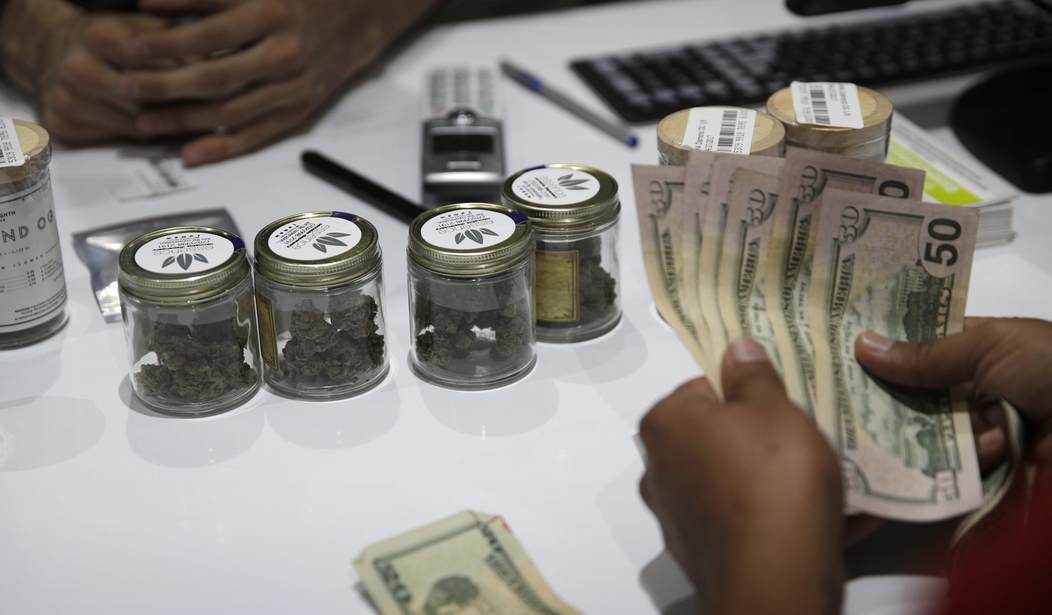A week after it went into effect, Nevada faced a major problem with a new law that legalized the recreational use of marijuana. Demand for pot was so high, and logistics to move weed so limited, that Gov. Brian Sandoval (R) was forced to declare a state of emergency to fix the state’s pot law.
A bargain reached between legal pot advocates and Nevada’s powerful liquor industry was the problem. Under the new law, pot could only be transported by licensed alcohol distributors. If pot was going to be the new competition for booze, the people who make liquor wanted their fair share. The math made sense, but relatively few of the distributors applied to move the now-legal pot.
The Nevada Tax Commission approved a resolution expanding the list of logistics companies that can transport marijuana. Sandoval, who never liked the idea of legalizing recreational marijuana, signed off on the order, and pot is now flowing to Nevada marijuana retailers.
So, Nevada solved that problem. What else could possibly go wrong? Plenty, according to a national group that agreed with Gov. Sandoval that it would be a mistake to legalize recreational marijuana.
The anti-pot group, Smart Approaches to Marijuana, warned Nevada at the end of July that its marijuana logistics problem was only a minor glitch compared to the long-term result of letting people spark a doobie just for the fun of the buzz.
SAM president Kevin Sabet said Nevada is in danger of “serious unintended consequences” if the state doesn’t make it tougher to get legal marijuana edibles and concentrates, and improve what he sees as a lax governmental tracking system.
“We think Nevada should be very, very concerned,” Sabet told reporters on a media teleconference July 31. “The cost of legalization will far outweigh the benefits for the residents of Nevada in the long run.”
Nevada officials told the Las Vegas Review-Journal that SAM has always opposed legalized marijuana and said Sabet’s argument shows he and the group still don’t understand the law and the state regulations that are a part of it.
“The governor has continuously called for a well-regulated, restricted and respected recreational marijuana industry in Nevada, and the Department has carried that charge every step of the way as we’ve implemented this program,” Tax Department spokeswoman Stephanie Klapstein said.
However, based on Colorado’s experience with legal weed, the regulation of pot products sold in stores may be the least of Nevada’s problems to come.
Colorado voters approved legalizing the recreational use of cannabis in 2012. People started toking to their hearts’ content in January 2014.
Over the past three years, Colorado officials announced July 19, the state has collected more than a half-billion dollars in tax revenue due to medical and recreational cannabis sales.
There is plenty of money in marijuana. Growers, legal and illegal, have known that for decades. But local law enforcement and politicians in Colorado are also finding that dealing with the dark side of the pot industry has become a challenge.
KKTV in Colorado Springs reported July 19 that problems associated with legal marijuana were the only topic at a “secret” meeting had been held involving some federal agencies, and the mayor and police chief of the city.
KKTV also reported that a public school student disciplinary director and a local doctor were involved in the secret sessions.
“The meetings are not open to the public because they include sensitive investigation information,” the statement from Mayor John Suthers read.
A few days after that secret meeting, District Attorney Dan May told reporters legal marijuana had become a “gateway to homicide” in Colorado as he announced indictments against 13 employees and the owners of a Colorado Springs cannabis accessory and gift shop.
He pointed to a Colorado Springs Police Department report that linked a “marijuana nexus” to at least 11 of the city’s 59 murders reported over the past three years.
“That’s not somebody just using marijuana, that’s somebody being murdered over a legal marijuana grow in their house, murdered over an illegal marijuana grow in their house,” May said.
Jason Warf, executive director of the Southern Colorado Cannabis Council, called May’s comment “nonsense.”
Colorado Springs City Council President Richard Skorman told the Gazette that because robberies and larceny were also connected to the city’s homicides “you could say diamond rings are also a gateway to murder.”
William Bennett, the nation’s first drug czar, told the Colorado Independent there was no question that the use of recreational marijuana by young people has increased.
“How could you do this to the children of Colorado?” Bennett said in an address to the Western Conservative Summit. “Why in God’s name would you make a drug available to children that destroys or inhibits force or attention?”
However, the 2015 Colorado Healthy Kids Survey showed middle and high school students’ use of marijuana a year after the legal pot law went into effect was “relatively” consistent with the years before the legalization of recreational marijuana.
Still, Bennett said marijuana legalization was on a “freight train” across America, but also predicted Colorado would do away with legalized cannabis in 10 years.








Join the conversation as a VIP Member